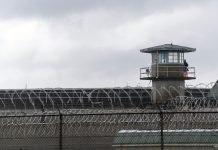
A recent report jointly prepared by three human rights organizations in Turkey has revealed that inmates were subjected to insults, threats and battery in two prisons in Turkey’s southern Adana and Kahramanmaraş provinces, Turkish Minute reported, citing the Mezopotamya news agency.
The report, prepared by the Çukurova Association for Assistance for Families of Prisoners and Convicts (Çukurova TUAYDER), the Lawyers Association for Freedom (ÖHD) and the Human Rights Association (İHD), is based on interviews with prisoners from the Kürkçüler T Type Closed Prison in Adana and the Türkoğlu L Type Prison No. 1 in Kahramanmaraş.
Inmates Mehmet Emin Ado, Zafer Bahadır, Ömer Toluk and Mustafa Özer, who were on July 9 transferred from the Ceyhan M Type Closed Prison to the Kürkçüler T Type Closed Prison, both in Adana, were battered by the prison guards because they refused to undergo a strip-search while being admitted to the prison, Mezopotamya said.
The inmates were insulted and attacked by the guards once again on Aug. 12, after they refused to form a line while they were waiting to be fingerprinted. Disciplinary proceedings were launched against them soon afterward.
According to Mezopotamya, the four inmates’ request to be sent to the infirmary to get an assault report from the doctor after the attack on Aug. 12 was refused, and they were threatened by the head guard, who told them, “I’m the God of this place and you’ll do as I say.”
Inmates Mehmet Erden, Sedat Karak and Veysi Altan in the Türkoğlu L Type Prison No. 1 were punished as a result of a disciplinary proceeding launched against them on the grounds that they went on a hunger strike in protest of the “isolation” of imprisoned leader of the outlawed Kurdistan Workers’ Party (PKK) Abdullah Öcalan, the report also said.
The inmates were protesting Öcalan’s inability to speak with his lawyers, which is commonly referred to in Turkish media reports as his “isolation.”
Despite the prisoners’ request to be in the same ward, the prison administration put them into separate wards far from each other in order to punish the inmates by preventing them from contacting one another, Mezopotamya said, adding that Karak wasn’t released on July 28, as was expected, due to the prison parole board’s negative evaluation of him.
Although there have been widespread claims of torture in Turkey’s prisons and detention centers, especially since an attempted coup claimed the lives of more than 250 civilians in Turkey on July 15, 2016, they have so far not been investigated.















